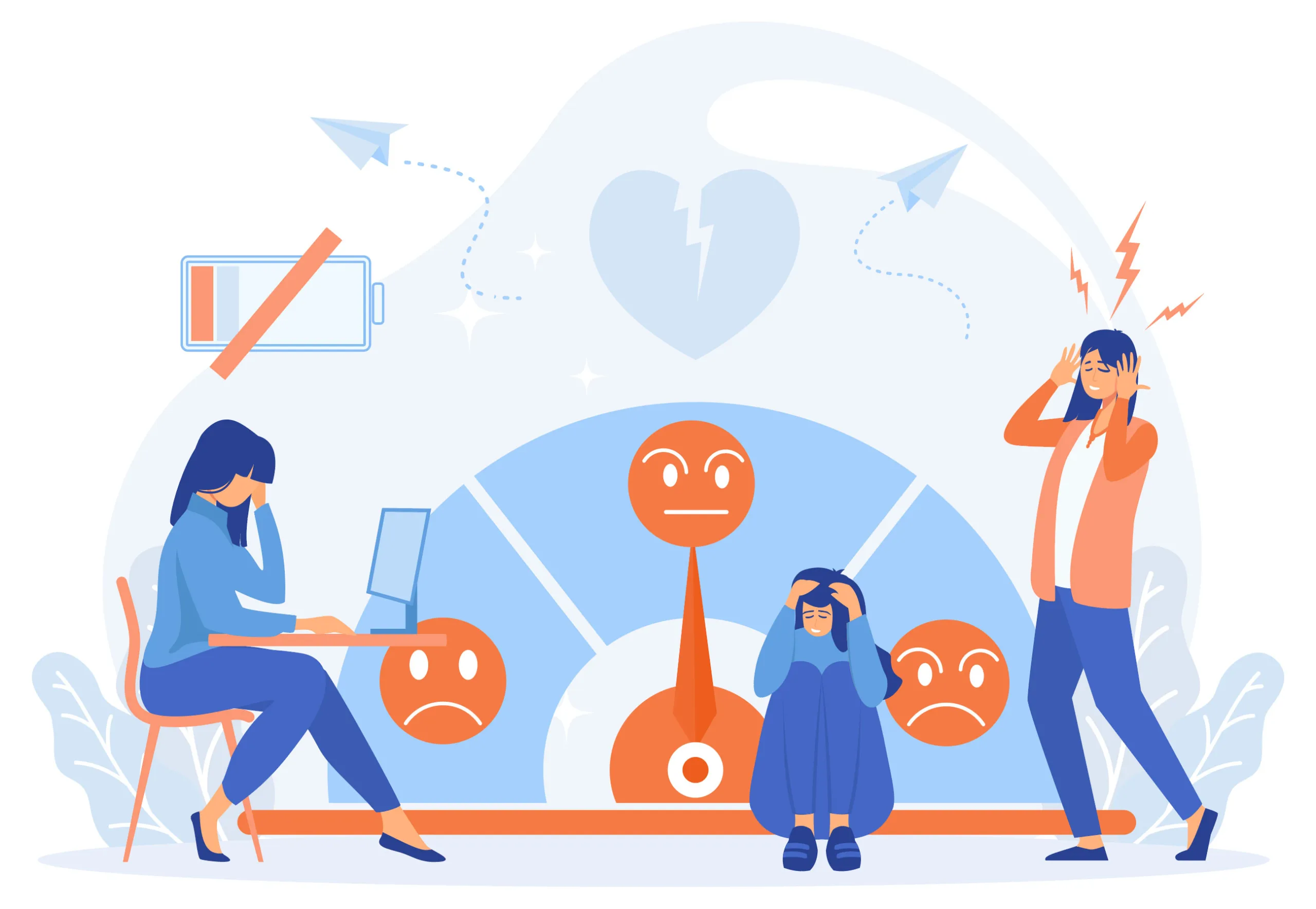Adapted from Glossary of Terms: A shared understanding of the common terms used to describe psychological trauma, version 3.0
Citation: Heber A, Testa V, Groll D, Ritchie K, Tam-Seto L, Mulligan A, Sullo E, Schick A, Bose E, Jabbari Y, Lopes J, Carleton RN. Glossary of terms: A shared understanding of the common terms used to describe psychological trauma, version 3.0. Health Promot Chronic Dis Prev Can. 2023;43(10/11). https://doi.org/10.24095/hpcdp.43.10/11.09
Acute stress disorder (ASD)
- A collection of feelings, behaviours, and experiences that can occur in the first month after a person is exposed to a potentially psychologically traumatic event (e.g. actual or threatened death, serious injury, or sexual violence). The exposure can occur in many ways. For more information about exposures that may lead to ASD, see potentially psychologically traumatic event (PPTE).
Clinical anxiety
- Describes anxiety symptoms severe enough to require formal medical or mental health treatment.
- Symptoms can include intense worry, nervousness, restlessness, rapid heart rate, muscle tension, irritability, trouble concentrating, and feelings of worry or dread, or physical changes such as increased blood pressure.
Clinical depression
- Describes symptoms of a major depressive episode that requires formal medical treatment.
- A major depressive episode typically lasts for a period of several weeks. Symptoms include feeling sad or numb, low mood, lack of interest in usual activities or relationships, difficulty concentrating, poor sleep, feelings of hopelessness, and sometimes, suicidal thoughts.
Complex posttraumatic stress disorder (C-PTSD)
- A type of posttraumatic stress disorder that results from experiencing repeated, severe psychologically traumatic events.
- People with C-PTSD have a profound loss or absence of a sense of identity and difficulty controlling their emotions. They are often involved in unstable relationships as adults, and often have patterns of impulsive choices, feelings of emotional instability, and behavioural problems. Sometimes they experience chronic unhappiness, suicidal thoughts, and suicide attempts.
Complex trauma
- A psychological injury that results from severe types of potentially psychologically traumatic events (PPTEs).
- Often used to refer to complex posttraumatic stress disorder (C-PTSD).
Counselling
- A form of talk therapy where a counsellor sits down with a client to help them work through their issues in a safe, confidential environment. Counselling can take many forms, ranging from in-person to online to telephone sessions.
Crisis
- An overwhelming event, which can include divorce, violence, the passing of a loved one, the discovery of a serious illness, or a major disaster. Can be used interchangeably with critical incident or potentially psychologically traumatic event (PPTE).
Crisis support
- A short-term management technique designed to reduce potential permanent damage to an individual affected by a crisis.
Critical incident
- Describes a potentially psychologically traumatic event (PPTE) that evokes unusually strong emotional reactions. Can be used interchangeably with crisis or potentially psychologically traumatic event (PPTE).
Depersonalization
- Feeling as though your body does not belong to you, or as if you’re “outside” of your body.
Derealization
- Feeling as though things around you are unreal or strange, as if you’re in a movie.
Dissociation
- A way to “numb out” in overwhelming situations by disconnecting from surroundings. It can involve depersonalization or derealization.
Gender-based violence
- Refers to any type of harmful behaviour against a person or group of people because of their sex, gender, sexual orientation, or gender identity.
Intersectionality
- Recognizes the multiple aspects of an individual’s identity that influence their experiences. Identity factors include ethnicity, religion, age, physical and cognitive ability, sex, gender identity, sexual orientation, and socioeconomic status.
Interpersonal violence
- The harmful physical and psychological behaviour by a person or group of people toward another person. It is a type of potentially psychologically traumatic event (PPTE) and can contribute to mental health conditions in either the person causing the harm or the person who is harmed.

Mental health
- Mental refers to thoughts, feelings, emotions, and related brain functioning.
- Mental health exists on a continuum from poor to good. In good mental health, a person:
- understands themselves and their abilities
- copes well with normal stress
- experiences good feelings from their interactions and relationships with others
- is able to work or function well in their usual activities, and
- contributes to their family and/or community.
Mental health injury/psychological injury
- May be used as different names for a mental health condition, including a mental disorder, especially when the condition is caused by exposure to one or more potentially psychologically traumatic events.
- The word “injury” is used when describing mental disorders or conditions to try to reduce the stigma associated with mental illness.
Mental illness
- Refers to emotions, behaviours, and difficulties in thinking that affect a person’s ability to clearly understand the real world and what is happening to them and around them. These emotions, behaviours, and difficulties are generally the signs and symptoms of a mental illness. The signs and symptoms of a mental illness can range from mild to severe.
- Mental illness is often accompanied by distress and decreased functioning in social, occupational, or other activities of daily life.
Moral injury/moral distress
- During potentially psychologically traumatic events (PPTEs) or other unusually stressful situations, people may carry out, witness, or fail to prevent events that go against their moral beliefs and expectations.
- A moral injury can occur in response to doing something or witnessing behaviours or acts that go against a person’s values and moral beliefs. Events that cause moral injury can be:
- acts of commission (what someone has done)acts of omission (what someone has failed to do), or
- acts of betrayal.
Peer support
- A supportive, recovery-oriented relationship between individuals who have had or have the same experience, that is, they have a shared lived or living experience. It can offer social, emotional, spiritual, and instrumental support to promote a person’s well-being and path to recovery from mental health problems.
- Peer support can be delivered one-to-one or by a group, and some peer support is a combination of both.
Posttraumatic growth (PTG)
- The positive personal changes that may result from a person’s struggle to manage the consequences of being exposed to one or more potentially psychologically traumatic events. PTG can include a new appreciation for life and future possibilities, a newfound sense of personal strength, improved relationships with others (e.g. a new focus on helping others), and spiritual or existential change.
Posttraumatic stress (PTS)
- Refers to stress resulting from exposure to one or more potentially psychologically traumatic events (PPTEs).
Posttraumatic stress disorder (PTSD)
- The collection of feelings, behaviours, and experiences that can occur after a person is exposed to a potentially psychologically traumatic event (PPTE). The exposure can occur in many ways. For details of exposures that may be associated with a PTSD diagnosis, see potentially psychologically traumatic event (PPTE).
- PTSD reactions can include:
- immediate feelings of terror, panic, anxiety, rage, or sickness when exposed to a sound, sight, or smell that is a reminder of the event
- vivid and intrusive memories of the event, which can sometimes feel as if the event is happening again (“flashbacks”)
- nightmares and disturbed sleep
- not remembering the event (amnesia), or feeling emotionally numb
- avoiding places, people, or circumstances that are reminders of the event
- being hyperalert to threat or danger, and
- feeling that things are unreal or that you are living in a dream (depersonalization or derealization).
Potentially psychologically traumatic event (PPTE)
- A stressful event that has caused psychological trauma and has the potential to cause PTSD and other trauma-related mental health conditions. This term is more precise than terms like critical incident or crisis.
- Typical examples of potentially psychologically traumatic events (PPTE) include:
- adverse childhood experiences
- motor vehicle accidents
- sexual assault and other types of violence
- unexpected violent or accidental death of a loved one or threatened death of a loved one, and
- threat of or actual severe physical injury, experiencing military combat, natural disasters, or exposure to human remains.

Psychological First Aid (PFA)
- An immediate way to help people after a disaster or traumatic event. PFA aims to provide support to reduce initial distress and promote resilience. By addressing basic needs such as safety, comfort, and emotional connection, PFA helps reduce the risk of long-term mental/emotional harm.
Recovery
- The personalized journey to a way of living that allows a person with a physical or mental health condition to have positive mental health and good well-being.
Resilience
- The long-term physical and mental determination that people draw on to deal with ongoing adversity. It is a quality that an individual may naturally possess or develop through work and life experiences.
Secondary traumatic stress
- Describes a mental health condition that results from indirect exposure to one or more potentially psychologically traumatic events (PPTEs). Such indirect exposure is also known as vicarious trauma.
Stigma
- A set of highly negative ideas and beliefs that society has about something. To be stigmatized means to be symbolically marked as a disgrace. Mental illnesses are among the most highly stigmatized conditions in society. When a health condition is stigmatized, the person experiences not only the symptoms of the condition itself, but also the social rejection, disapproval, and the shame that the stigmatization creates.
- There are four types of mental health stigma:
- Structural stigma is when organizational policies and practices are unfair to people with mental disorders.
- Public or interpersonal stigma is when the public think or act negatively toward people with a mental disorder.
- Self-stigma occurs when people with a mental disorder believe the negative public views and apply these views to themselves.
- Stigma-by-association is when those close to or related to the stigmatized group (such as family, friends, or mental health providers) are also stigmatized.
Trauma
- Something that causes physical, emotional, spiritual, or psychological harm.
- A person’s experience during an event that is so distressing to them that it overwhelms them emotionally; psychological trauma can be the cause of mental disorders such as posttraumatic stress disorder.
Vicarious trauma
- Refers to psychological trauma that can occur in people who are indirectly exposed to a potentially psychologically traumatic event (PPTE). Also known as secondary traumatic stress.
Well-being
- Can be defined using a broad framework that includes seven interacting domains:
- employment or meaningful purpose
- financial security
- health
- life skills and preparedness
- social integration
- housing and physical environment, and
- cultural and social environment.
Wellness
- There is no consensus on a definition, but some definitions of wellness overlap with definitions of well-being.
- Defined by the First Nations Mental Wellness Continuum Framework (FNMWCF) as a balance of the mental, physical, spiritual, and emotional. In this framework, mental wellness is enriched when a person has purpose, hope for their future, a sense of belonging, and a sense of meaning.
Wellness support
- Health services, programs, or activities that focus on the promotion or maintenance of good health. These supports are designed to improve well-being while reducing pain, stress, and anxiety.

Social support